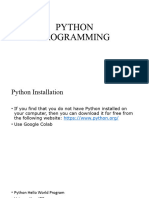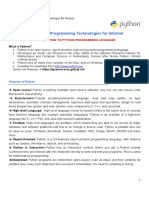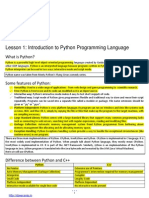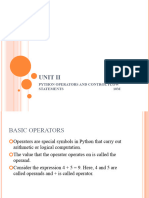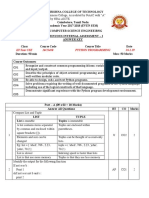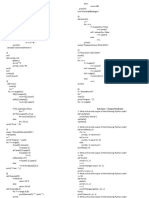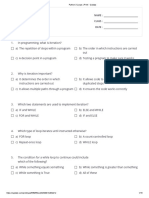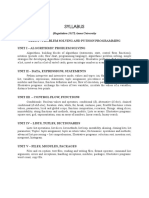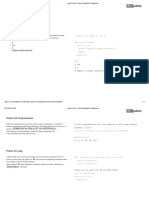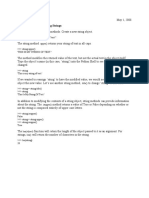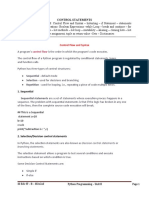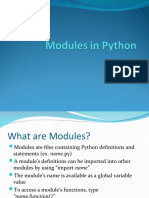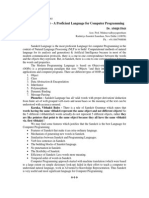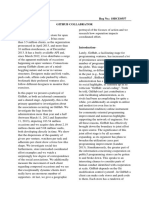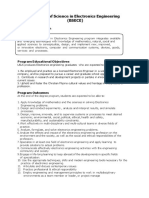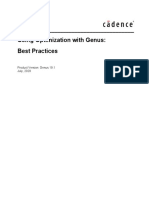Python
Modules
What are Python modules?
Files
with previously written code that can be
imported to the Python interpreter.
A module contains its own public and private
variables to prevent interferences with user
defined ones.
Modules file have .py extension
An example of a module
$ vim modex.py
def cube(x):
//Returns the value of x^3
return x*x*x,
Importing Modules
>>> import modex
>>> modex.cube(6)
216
>>> y = modex.cube(6)
>>>y
216
Accessing global variables in a
module
Using dot notation.
>>> a = anymodule.globalvar
Notethat a global variables will not affect another
module; i.e. modify module1.gvar will not change
the value of module2.gvar.
From/import statements
Used to import specific functions from a module
>>> from modex import cube
>>> cube(3)
>>>27
Executing modules as scripts
Python modules can be executed in command line
whith
python modex.py <arguments>
Compiled Python files
When importing modex.py, a modex.pyc file is
generated.
It contains the bytecode from the last time
modex.py is imported.
If there is no .pyc file exists, it is created
For future imports, these .pyc files are used to
speed up the loading time, not the execution time
The dir() function
This function returns a list of modules and
functions that have been imported
>>> dir()
[‘_ _name_ _’, ‘_ _package_ _’]
>>>import modex
>>>dir()
[‘_ _name_ _’, ‘_ _package_ _’,’_ _modex’]
Standard Modules
Python comes with a library of standard modules.
These modules contains built-in operations that are not
actually part of Python’s core
Some of them are only imported based on the OS. For
instance: winreg module is only provided on Windows
systems.
An important Std module is sys. it is used to change the search
path for the module
>>> sys.path.append(‘/home/pnp29/cs265_spring_2011
Standard modules
There is a standard library of Python modules
These modules contain built-in operations that are
not actually a part of Python at its core
Some modules are only imported if a certain
operating system is being used
One important library module is sys
The sys module
Two variable contained in sys, ps1 and ps2, hold the
values of the strings in the primary and secondary
prompts. These strings can be changed to your
preference.
>>> import sys
>>> sys.ps1 = 'plurt> '
plurt> print ‘plurt'
plurt
plurt>
The dir() function
The dir() function returns a list of names (variables
and functions) that are defined by the module
passed to it.
>>> dir(sqrt)
[‘num', ‘result']
When dir is executed with no arguments, it returns
a list of all currently defined names, except those
that are built-in
Packages
Packages are organized collections of modules,
modules within modules
Modules are stored in directories, with each
directory containing a __init__.py file that tells the
interpreter that it is a package directory
Each subdirectory of root package directory is
considered a subpackage
Packages, cont’d
The package or any of its subpackages may then
be imported.
import currency.conversion.euro
Any of euro’s definitions or subpackages can now
be accessed, but only using dots:
euro.convertfromdollar(10)
Importing * from a package
Sometimes you may want to import everything
inside a package or subpackage. In this case you
may use this command:
from example.subexample import *
This loads all module names contained in variable
__all__, which is itself contained in the package
directory’s __init__.py file.
Importing * from a package,
cont’d
If__all__ variable is not defined, then by default,
importing * from a package will import all defined
names of the package, and the package itself. Any
submodules will not be imported unless they are
explicitly imported by __init__.py or by
Intra-package references
Any module in a package may import any other
modules in the same directory by name without
using any dots
For importing any modules in a sibling folder, a
module may use an absolute import
Packages in multiple directories
The location in which a package searches for its
__init__.py may be changed, by modifying the
variable __path__, which stores the value of the
directory the __init__.py is in
Packages
They are organized collections of modules.
Modules are stored in directories
Each directory contains a __init__.py file which
tells the Python interpreter that it is a package
directory.
Example of a package
math/
__init__.py
triArea.py
sqArea.py
statistics/
__init__.py
meanVal.py
Example of using packages
>>> import math.sqArea
>>> math.sqArea.area(5)
25
>>> from math.sqArea import area
>>> area(5)
25
Questions?
Sources
http://docs.python.org/tutorial/modules.html






